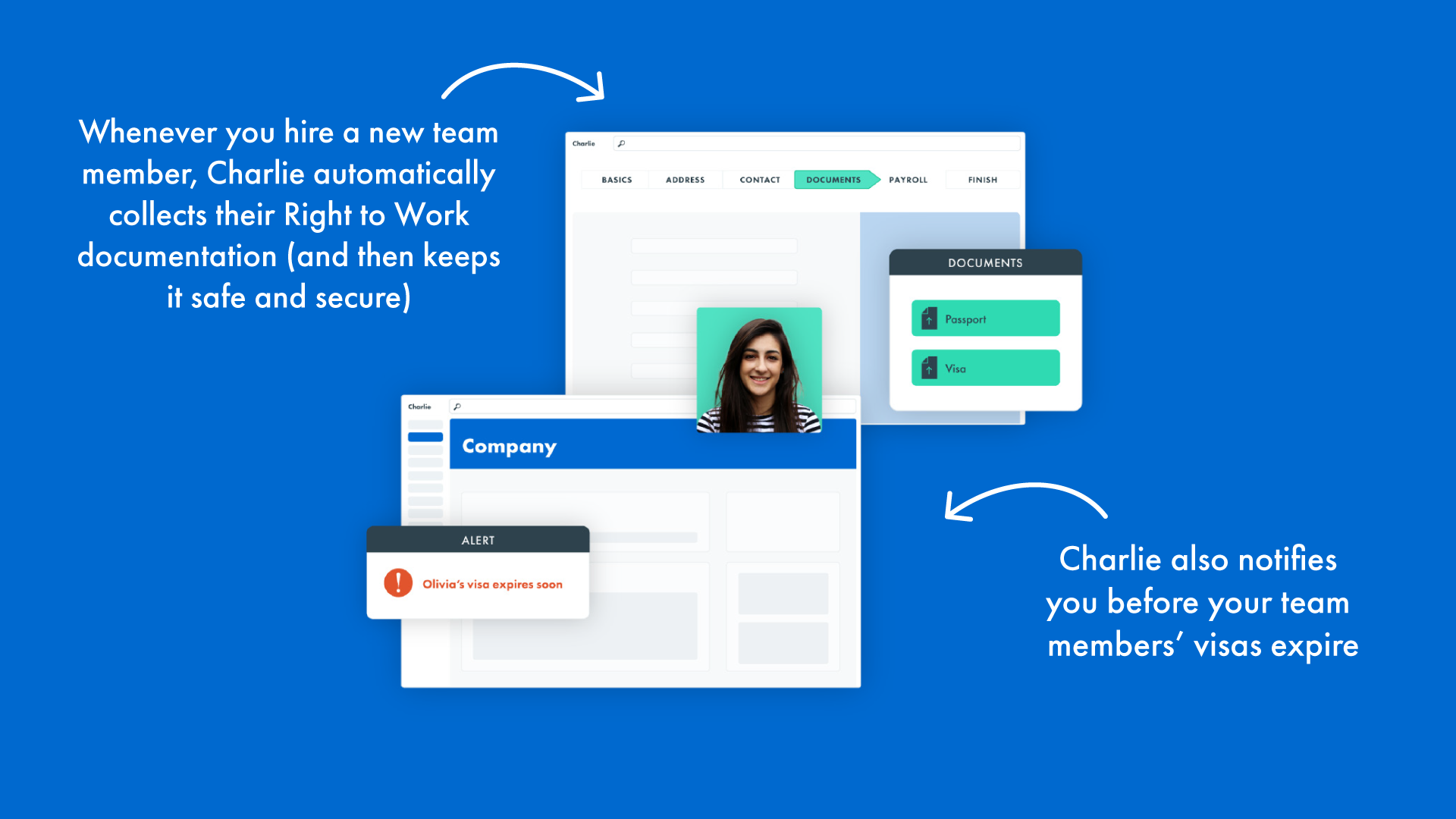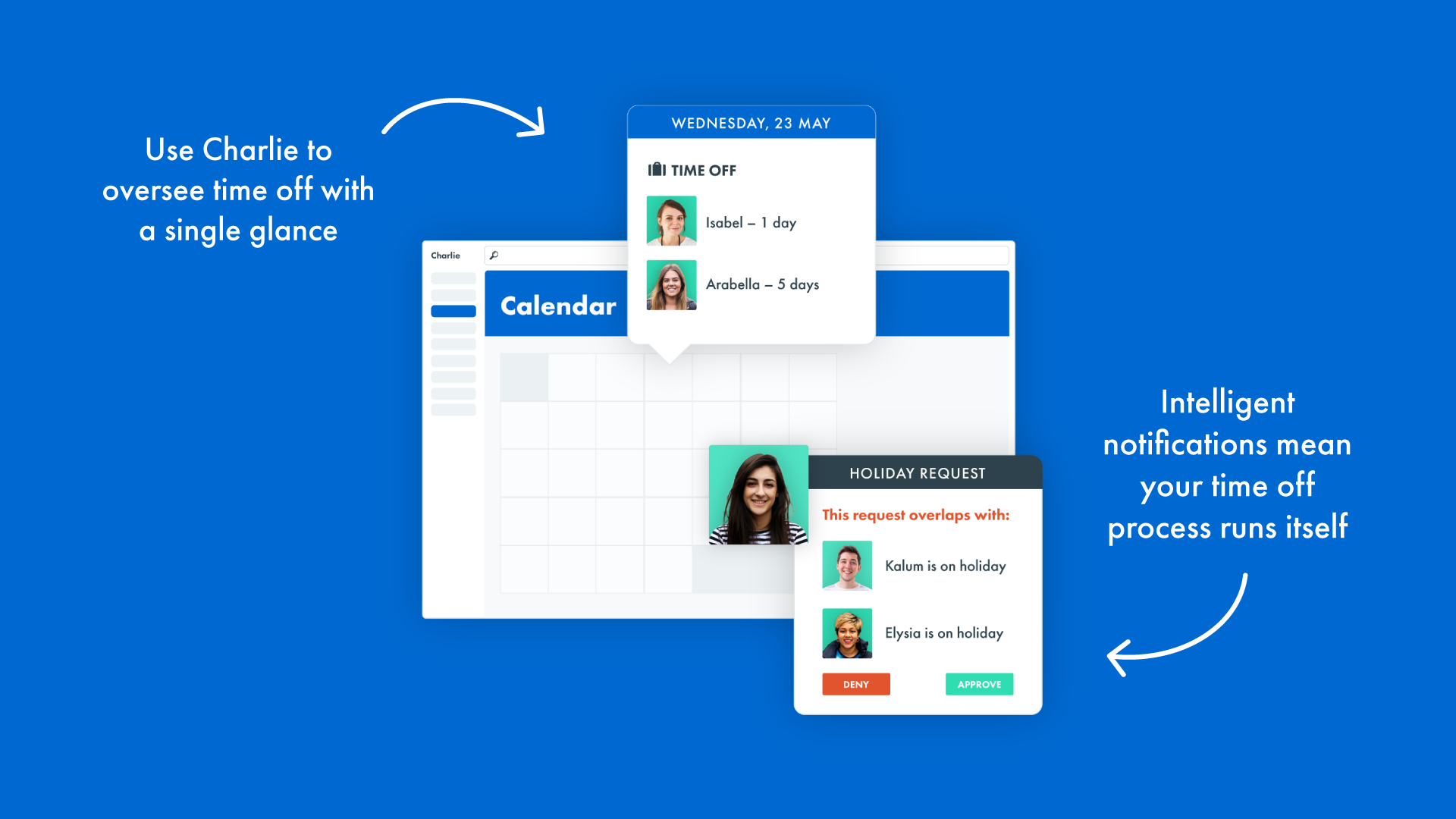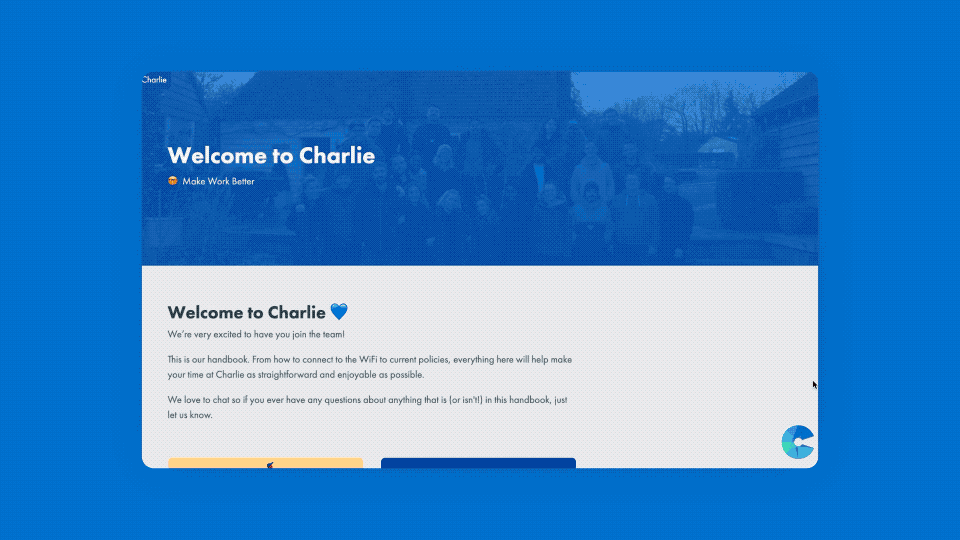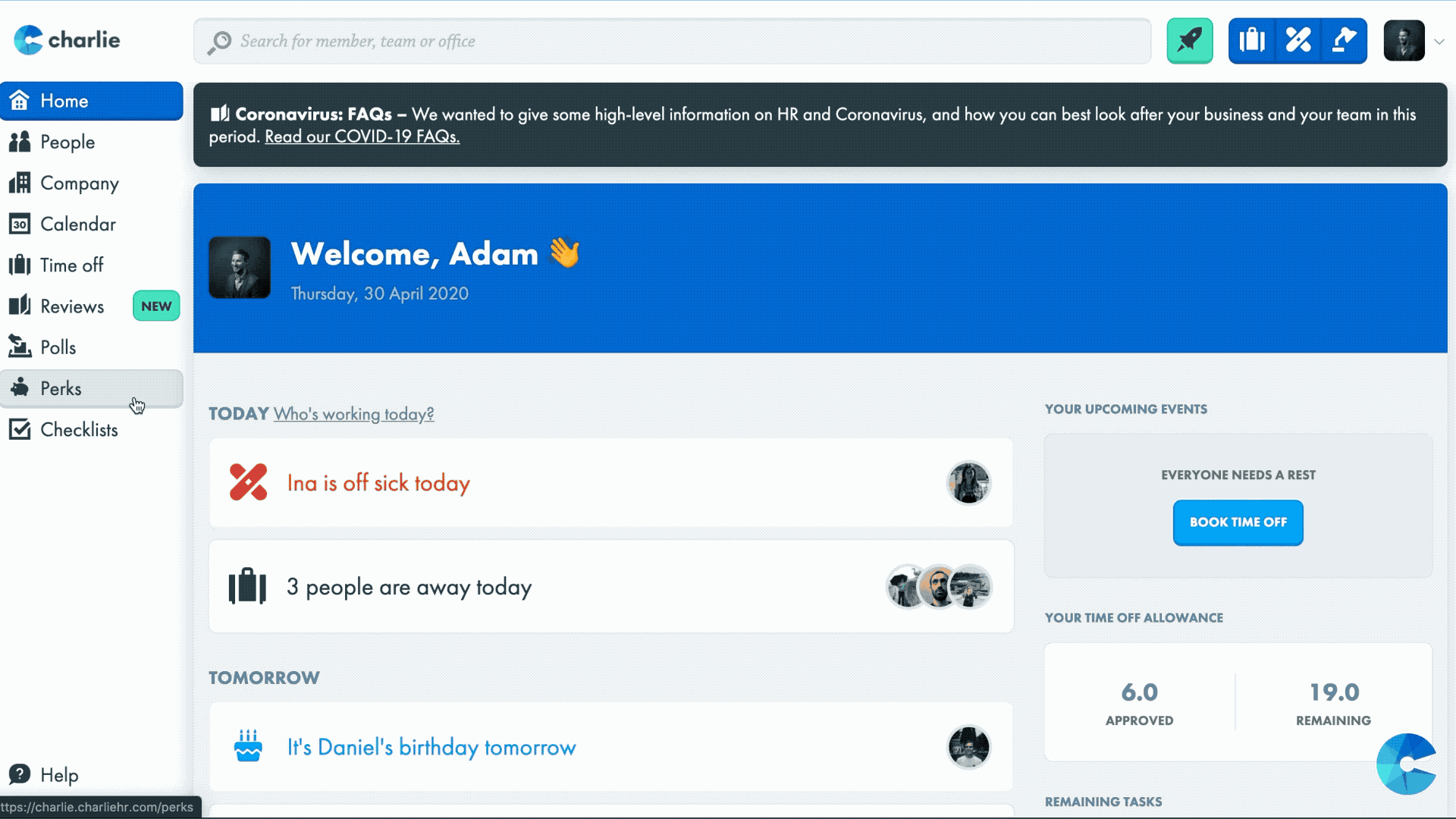HR for Startups: 7 Key Elements for Success

Charlie’s startup journey began back in 2015. Ever since then, we’ve endeavoured to build a business with high-performing team members. We’ve made more than a few mistakes and experienced our fair share of challenges – but going on that journey taught us a lot about what HR for startups is about.
- 1 – 4 reasons a startup needs HR
- 2 – What does an HR team do exactly?
- 3 – Laying good HR foundations
- 4 – An onboarding process to scale
- 5 – Compensation and benefits
- 6 – Growth and Development
- 7 – Build your HR stack
- 7 – Bonus: tips to build your HR for startups department
I'm Ben, CharlieHR's CEO, and I’ve spent the bulk of my adult life starting businesses. Over that time, I got to know pretty intimately the challenges that every new startup will face: never enough time, never enough resources, never feeling 100% certain how best to look after your team – I understood these issues well because I'd been grappling with them all our working lives and that's what I'd like to talk to you about today.

The 4 reasons a startup really needs HR
Does a startup really need HR? It's a fair question to ask, and one I've heard many times from other founders and startups like ourselves.
After all, it's legitimate to ask whether companies of 10 to 100 people really need an HR department or to focus on it when it's not a legal requirement.
We'll come back to what the legal requirements are later. For me, however, here are the 4 reasons why your business should not take HR for granted:
- Make the best hiring decisions and ensure you have a team that's performing at its best
- Optimise retention with people who will be with you in the long run
- Focus on long-term success by building an HR strategy that implements wellbeing initiatives and HR policies to avoid burnout
- Ensure you stay compliant by having proper onboarding, recruiting and offboarding processes along with all the other requirements a business needs to meet
What does an HR team do exactly?
Another question I need to answer. After all, if HR teams are not transparent enough about their day-to-day tasks, it can be complicated.
The reality is that, in most startups and small businesses, HR is just another hat that a founder, operations manager or office assistant needs to wear – so an HR team is really diverse and can perform a lot of different tasks. However, here are the main ones I identified:
- Onboarding new team members and offboarding leavers
- Ensuring the business meets the legal requirements and stay on top of work legislation
- Seeking HR services for startups outside the business for more complex situations if they don't have HR training
- Answering questions from team members when it comes to benefits, HR policies, etc.
- Dealing with time off management such as approving holidays, cancelling and amending requests, updating allowances
- Taking care of company-wide announcements for any changes in HR policies or any major changes in the company
- Dealing with reimbursement requests and third parties for benefits
- Organising interviews and recruitment processes
- Sending off contracts and chasing signatures
Of course, this is just a snippet of what an HR team does, but as your company grows, these tasks will build up over time. That's where building your HR stack can come in handy, as well as making sure you have the right processes in place.
HR for Startups Part 1: Laying good HR foundations
Most of the items on this list are legal requirements that you need to get in place to keep your startup on the right side of the law. A couple of others aren’t strictly essential, but getting them in place now is going to save you a whole lot of time and headaches in the future.
1. Employment contracts
Your startup's first step towards 'good HR' is nailing down your team’s employment contracts.
It’s common for early-stage startups to have a fairly casual attitude towards contracts – when your company is just a handful of people, it’s tempting to think that a template you’ve downloaded off the internet and a bit of goodwill is enough to see you through.
But when it comes to people’s jobs and livelihoods, you need the security of contracts drawn up by a professional. Without that clarity, you’re leaving a lot of space for misunderstandings to escalate into full-blown conflicts that end in legal action.
Proper contracts of employment, written by a Human Resources expert and tailored to fit your startup’s unique context are absolutely essential – whatever the size of your company.
2. The three mandatory HR policies you need to protect your business
According to UK employment law, every company needs three specific HR policies on file.
It doesn’t matter how new your small business is – if your startup doesn’t have these documents, then it’s already in breach of employment law. Without them, your business is vulnerable to legal action that could lead to paying out large amounts in compensation.
Just as with your employment contracts, you also need to bear in mind that templates downloaded from the internet will only get you so far. The cover these templates give you is patchy at best – to protect you properly, these policies need to be tailored specifically to your business.
As an example, the law on Health & Safety Policies requires you to carry out what is called an H&S assessment. That means a thorough examination of the way your company’s work is carried out – so generic templates won't give you that insight.
There's a lot more to this, so download the guide below and we'll walk you through each of those policies in turn, and show you how to protect your business.
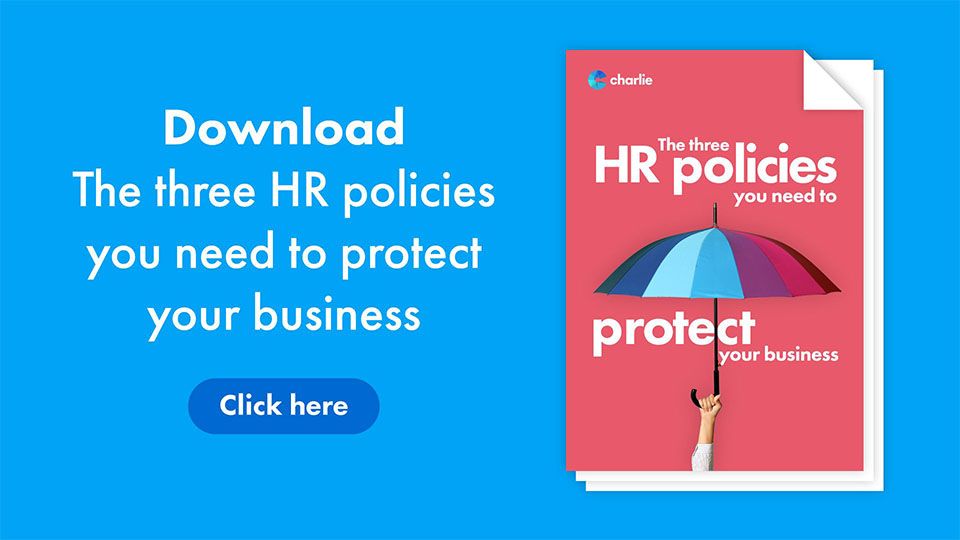
3. Check and store your employee records
Storing your employee records is an important part of your HR job – it means storing them securely and having them on hand whenever you need them. Here are a few things to remember:
- As a general rule, you should hold the following information from your team members: name and surname, date of birth, nationality, telephone number, email address, address, next of kin contact information
- Every employer in the UK has a responsibility to keep a record of their employees' Right to Work documentation. For team members from the UK, that’s pretty straightforward – just keeping a scan of their passport will do the trick.
- Nationals from other parts of the world either need to have settled (or pre-settled) status, or a visa that gives them the right to work in the UK. In either case, you’ll need to keep a record of their right to work documentation on file
- Every new hire needs to provide a P45 and fill in a new starter checklist for HRMC purpose
- You should also store their bank details, payroll ID and NI number somewhere safe as well as their legal gender and status to make sure you communicate it with HRMC for tax reasons
That's a lot of details to have on your hands, and that's where an HR software for small businesses can help you to store important documents, and you won't even have to set reminders in your calendar for visa expiry dates – that's done automatically by your HR software.
4. Get your Employers’ Liability insurance in place
Every employer based in the UK needs valid Employers’ Liability insurance – this is designed to cover you in case one of your team becomes ill or injured carrying out their work for you.
Hopefully, you’re never going to need this, but it’s an essential piece of ‘HR hygiene’ you need to get ticked off (the maximum fine for not being properly insured is £25,000 per day!).
5. Get your team enrolled in a workplace pension
Under the 2008 Pensions Act 2008, every employer in the UK must put certain staff into a workplace pension and make contributions to it. You can check up on your company’s responsibilities by heading to The Pension Regulator.
6. Set up a time off management process
When your startup is only four or five people, using spreadsheets to track time off and sick days is just about workable. But as your team grows, this breaks down pretty quickly.
You can remove yourself from the time off process by using HR software. HR systems can calculate prorated holiday allowances and rollover for you, as well as flag any overlapping time off within your team.
7. Build a bespoke company handbook
This is one of the HR basics for small businesses you need to think about: an employee handbook.
A company handbook (you can call them both) is where the three compliance policies we were just talking about will live, but that's just the bare minimum you can do.
As you grow, you'll want to add more guidance as to how you see things at your business to reflect the values you want to pursue. Not only will you want to write policies about leave requests or remote working, but you might also want to start thinking about implementing mental health or DE&I policies.
Your HR policies will ultimately be one of the reasons why people join your business and the more forward-thinking they are, the more likely you are to appeal to new joiners.
8. Download an HR checklist for startups
What we've outlined above is a very rough plan of what you should get up to when starting your new business, but of course, you might want some more guidance on how to do it and a concrete plan to follow.
Perhaps that's where an HR checklist can come in handy. Our team created a specific checklist to make sure all startups know what to do each step of the way. You can download it below.
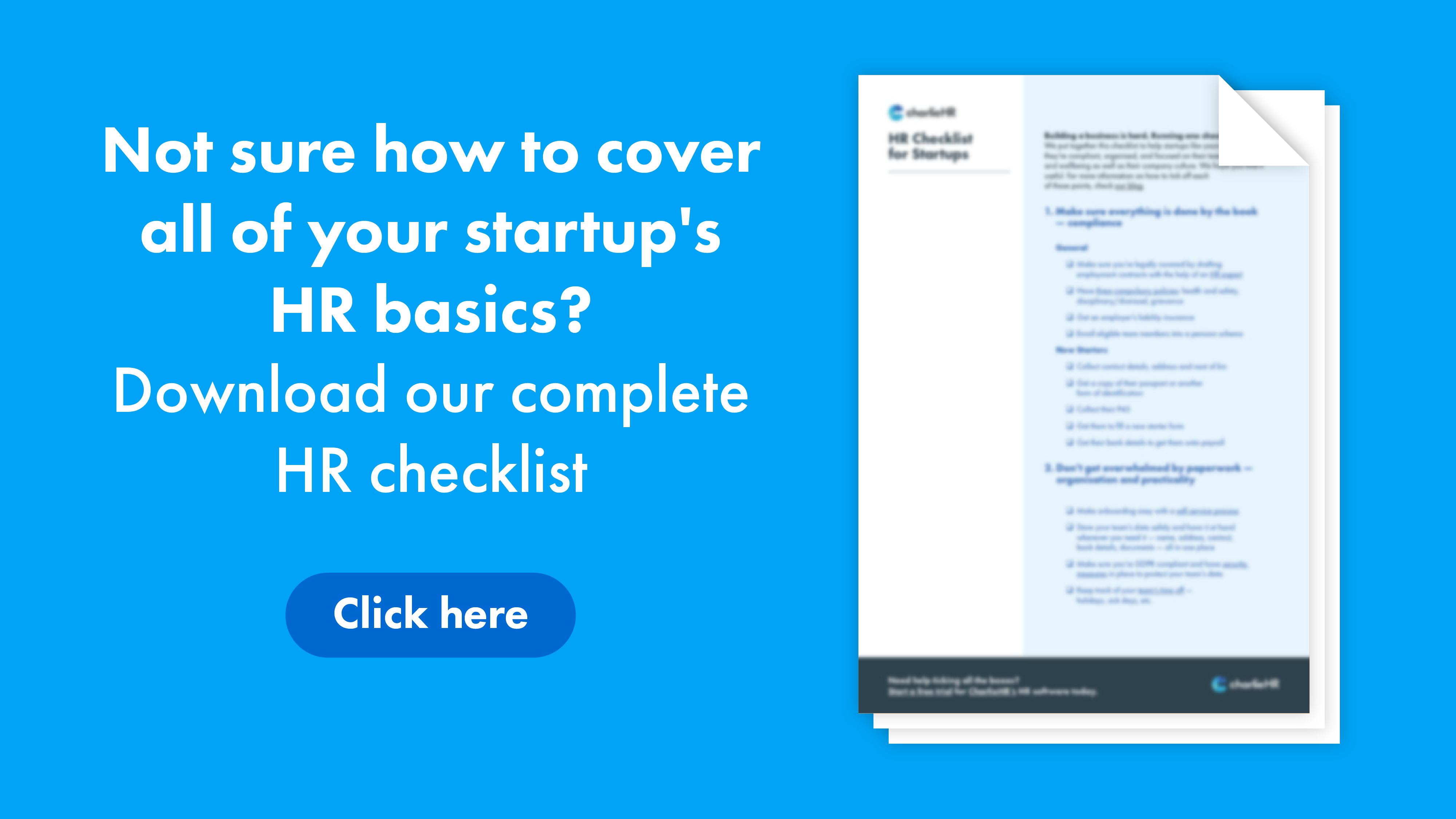
HR for Startups Part 2: onboarding process
1. Getting all the right paperwork for onboarding
Whenever you bring someone new into your business, there’s a whole load of legal admin you need to work through:
- Right to Work documents
- P45
- New starter Form
- Contracts of employment
- Next of kin
Don't forget any of these, just to make sure you stay compliant.
2. Making your new hire feel welcome
Starting a job at a new company can be a daunting experience. There are going to be a lot of unfamiliar faces and it can take a while before they really feel ‘part of the gang’.
It's easy to give the new employee a warm welcome right from the start whether that's remotely or in-person. Here are a few ideas of what can be done:
- Ensure you communicate clearly as to what they need to do on their first day
- Organise a lunch or call with other members of the team so they can introduce themselves and get to know the new hire
- Put together a social soon enough whether that's in person or remotely
- Get their managers to take them out for lunch
- Wrap up the day with a catch up
- Get all the documents they need to read on their first day and let them have a look during the first week so they can get familiar with HR policies
HR for Startups Part 3: Compensation and benefits
In today’s job market, the best talent wants to work in an environment where they feel valued and appreciated.
What this means for today’s startups is that a focus on compensation and employee wellbeing is an absolute necessity to improve employee retention (check out what the best London startups do in that area).
1. Setting up salaries to attract the best talent
One crucial aspect that startups and small businesses shouldn't ignore is how competitive the job market now is, which means you're still going to have to set up salaries that reflect people's skills and experience.
Despite the lack of resources that might be available to you right now, you shouldn't ignore setting the right salaries when you start your business. Here's some advice based on our own experience doing it at Charlie:
- Be transparent in your job ads about the salary range you can offer depending on role and experience
- Set up a progression framework with levels and sub-levels to give team members a clear view of their career path (this will also give you the opportunity to set them up to be high performing)
- Calculate how much you can offer and set salary expectations for all the levels of your progression framework
2. Get the right benefits for your team
When you’ve just started up a business, money is always tight. For many startups, spending extra cash on treating their team can feel like a luxury.
There’s also the question of what to even spend that money on – you need it to go a long way and it can be tricky figuring out what you can offer that everyone on the team will appreciate.
These were the challenges we had in mind when we put together Charlie’s Perks feature, a solution designed specifically for startups like us.
Perks put that choice in the hands of your team, giving them access to a huge range of benefits, discounts and deals to choose from.
But most importantly, Perks is seriously cost-effective – no need to pay extra to unlock the feature as it's included in every subscription.
HR for Startups Part 4: Encourage growth and development
Today, the most successful startups are the ones that make growth and development a central part of their culture.
There are a couple of reasons for this. First, the best talent now has an expectation that they’re going to be nurtured in their roles. Without that sense of development, it’s harder to attract and retain people who want to grow.
Second, the performance of your team is the single biggest factor in the success of your business. They are the ones driving your business forward – help them to perform at their best, and you’ll reap the rewards.
1. Setting up performance management at your startup
There are a hundred different ways to run performance reviews, and just as many products, tools and apps to help you do it.
But running a startup is complicated enough already. Most of the time, it feels like you barely have the capacity to do reviews at all, let alone test all the solutions and design your own process from scratch.
For most startups below the 20-person mark, the key to a good review process is keeping things simple. You need a process that makes an impact, but is also easy to roll out and doesn’t need loads of supervision.
That's where automation comes into play. Charlie's own performance review feature sets teams up for success with:
- Templates to streamline the review process and drive conversations
- Automatic reminders to avoid getting sidetracked by other priorities and not do reviews
- A process that can be set up in a few clicks and where team members and managers submit assessments that they then discuss
All the while, you can overview the process at a glance through your dashboard. The more regular and automated the process, the easier it becomes to run great performance reviews at your business and to make it a habit for your team.
2. Having a Learning and Development budget for your team
To support your performance reviews, you should also think about setting a Learning and Development budget for your team.
At Charlie, we allocate a fair amount every year for our team members to develop their skills and make sure they can bring something new to the table as well as feel like they're making progress within their roles.
You can also learn more about what our friends at LearnAmp did for their own L&D in this blog post.
3. Set up a progression framework
As we previously mentioned, setting up a progression framework will help you by:
- Allowing for more equality at your business by having a no-negotiation policy and setting salaries based on skills and experience
- Having a clear set of expectations and goals to assess for each role, whether it's about promotions or hiring someone new in the team
- Attracting the best talent by setting a clear pathway to promotions and growth
Discover how it's done with our blog about building a career progression system.
HR for Startups Part 5: Build your HR stack
There is a multitude of ways you can set strong foundations for your HR, but automating and streamlining your processes as much as possible will ultimately be key to your growth.
Here's how you can do it by building up the right HR stack for your team:
- Get HR software that will allow you to onboard your team members, deal with time off, sort out your employee records and much more such as performance management and benefits
- Find the right payroll solution for your small business and make sure it's as efficient as possible
- Get a productivity and note-taking app like Notion where you can store all your team's work in one centralised space
- Have an internal chat system where you can communicate internally with your team such as Slack
- Look for the right integrations so you can build seamless workflows
Bonus: tips to build your HR for startups department
For me, building your HR department goes with a few key points:
- Make sure you have clear goals and priorities in mind – your HR department should be here to tackle specific problems. You first need to sit down and understand where your processes could be improved and what's the biggest challenge your company is facing when it comes to growth. Prioritise and give HR the role it needs to help you get there.
- Get your paperwork in order – maybe you first need to run a compliance audit to understand whether you've got everything you need. Among a few things, here are the examples of what you will need to figure out: employment contracts, hours of work and overtime, holiday policy, termination records, performance procedure, payroll, health and safety, etc. These are just a few.
- Focus on creating a happy and high-performing workforce – what does that mean exactly? Well, for me, it's a combination of all the aspects of HR where your team members feel supported mentally and physically, able to do their best work with the right material, management and benefits that will serve them.
- Embrace diversity – whether it's within your staff (especially in the HR function) or during the recruitment process, audit your business to understand where your biases are to create a DE&I policy to tackle them. This will not only ensure everyone is treated equally but will also broaden your recruitment perspectives.

